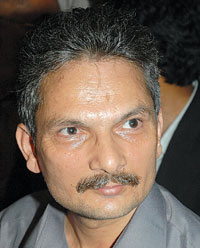|
|
Radio Sagarmatha: Is it now confirmed that your party will be joining the interim government?
Baburam Bhatarai: This is more about the interim constitution rather than just about just joining the interim government. We will join the interim government, but other things need to happen: date for the constituent assembly elections, dissolving parliament.
Can we expect a tussle about who will join the government?
We haven't yet reached that stage. It will be decided on the basis of a mutual agreement between the parties and civil society in the same manner in which the movement was made successful by the three powers after the 12-point agreement.
You've argued for a leadership role for your party.
That is the usual practice. The ground reality is that people believe a full-fledged democracy, peace and progress will only be possible if the leadership is in the hands of the Maoists. But we don't want to make this the major issue and argue about it.
What place will the king have in the interim constitution?
We feel there is no need for the king to have a place because the Nepali people have already abandoned the monarchy. The movement was proof of that. Likewise, the parliamentary parties have made proclamations which are proof that they want to head the same way. What we have proposed is to declare a democratic peoples republic when forming the interim constitution and to give it a structure through the constituent assembly.
Looks like the NC doesn't want to go along with this.
That will be clear during the process. We feel there is a strong faction within the NC which is for a republic. Other major parties are also going for a republic. Our proposal is not to keep the king as head of state.
The national political convention that you had been demanding will not take place now?
After the dissolution of parliament and the creation of a representative system by the constituent assembly, the issue will arise of where do sovereign and ruling powers lie. We feel that an interim structure must be created, which is why we have put forth a proposal for a national political convention that includes the seven parties, us, civil society and various fronts representing regions, ethnicities and castes.
The interim government will be a division of powers that will take us to the constituent assembly?
It should not be taken as a division of power. The movement has given its mandate to the political and organised powers, those who were active during the movement including civil society. We should move forward using these powers. Instead of calling it a division of power it should be better understood as a provisional administration.
Thirteen thousand people have died, how will there be a republic?
The people's movement which happened based on the support of the peoples' war and with the support of the 12-point agreement, brought the country towards a republic. Had the political parties not given in to pressure from the king and foreign powers we would have had a republic by now. Still, instead of heading directly into a republic we will go through an interim system. There is no way to stop the republic now. Ninety percent of the people are for a republic. If you can't even accept that, then there is no use calling yourself a democrat.
Will your cadres accept this bourgeois republic? Or is there dissatisfaction within the ranks?
That is our program. There is no question of not accepting it. That is the constitution of our party and the revolution. Our constitution and programs are clear: that the bourgeois republic will be formed under the leadership and participation of the proletariat.
Couldn't you have worked with the 1990 constitution?
You have to understand that a democratic republic is not a parliamentary republic. Our understanding is that a democratic republic is an interim provision slightly above a parliamentary republic but which has not reached the level of people's republic. This could not happen through the 1990 constitution. It will be brought by the present struggle and movement for formation of new laws from the constituent assembly.
There is a rumour that your party will be excluded from communist organisations like RIM and COMPOSA if you join the government?
No. RIM and COMPOSA are our participatory organisations so there is no question of us being excluded from them. Different parties have their own programs and differences in opinion will exist. We are in various committees of RIM and COMPOSA and no one can take us out of them.
What is the nature of your democratic republic?
In a democratic republic there will be no monarchy and the people will have complete power. Second, the army which has been loyal to the monarchy for 237 years, must be democratised, restructured and a new force raised. Third, the present form of government is feudalistic and Brahminised. A government that represents everyone, the exploited, the ethnic castes, various regions will be formed. Basic democratic norms such as competitive state system, rule of law and human rights will be an integral part of this system. The rights of women, Dalits and basic rights to education, health and employment will be secured. In the economic front revolutionary land reforms will take place. For a long time, Indian investments in Nepal have been under a semi-colonial style monopoly. This will end and, Nepal will be developed as an independent democratic republic.
You say you are against personality cults, yet you glorify Prachandapath.
It's not about not keeping Prachandapath. I was the one who proposed Prachandapath. It was natural for us to name the ideology after the chairman of the party. I have never been against Prachanda's leadership or Prachandapath itself.



